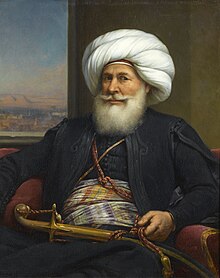
Back محمد علي باشا Arabic محمد على باشا ARZ Mehmet Alí AST Kavalalı Mehmed Əli Paşa Azerbaijani محمدعلی پاشا AZB Mohammad Ali Paschah BAR Мухамед Алі Егіпецкі Byelorussian Мохамед Али паша Bulgarian মুহাম্মদ আলি পাশা Bengali/Bangla Muhàmmad Alí Paixà Catalan
Muhammad Ali[a] (4 March 1769 – 2 August 1849) was the Ottoman Albanian[3] governor and de facto ruler of Egypt from 1805 to 1848, considered the founder of modern Egypt. At the height of his rule, he controlled Egypt, Sudan, Hejaz, Najd, the Levant, Crete and parts of Greece.
He was a military commander in an Albanian Ottoman force sent to recover Egypt from French occupation under Napoleon. Following Napoleon's withdrawal, Muhammad Ali rose to power through a series of political maneuvers, and in 1805 he was named Wāli (governor) of Egypt and gained the rank of Pasha.
As Wāli, Ali attempted to modernize Egypt by instituting dramatic reforms in the military, economic and cultural spheres. He also initiated a violent purge of the Mamluks, consolidating his rule and permanently ending the Mamluk hold over Egypt.
Militarily, Ali recaptured the Arabian territories for the sultan, and conquered Sudan of his own accord. His attempt at suppressing the Greek rebellion failed decisively, however, following an intervention by the European powers at Navarino. In 1831, Ali waged war against the sultan, capturing Syria, crossing into Anatolia and directly threatening Constantinople, but the European powers forced him to retreat. After a failed Ottoman invasion of Syria in 1839, he launched another invasion of the Ottoman Empire in 1840; he defeated the Ottomans again and opened the way towards a capture of Constantinople. Faced with another European intervention, he accepted a brokered peace in 1842 and withdrew from the Levant; in return, he and his descendants were granted hereditary rule over Egypt and Sudan. His dynasty would rule Egypt until the revolution of 1952 when King Farouk was overthrown by the Free Officers Movement led by Mohamed Naguib and Gamal Abdel Nasser, establishing the Republic of Egypt.
- ^ "Mohammed Ali". Blackwood's Edinburgh Magazine. 49 (303): 65–82. January–June 1841 – via Google Books.
- ^ Khalid Fahmy (1998). All the Pasha's Men: Mehmed Ali, his Army and the Making of Modern Egypt. Cambridge University Press.
- ^ Özavcı, Hilmi Ozan (2021). Dangerous Gifts: Imperialism, Security, and Civil Wars in the Levant, 1798-1864. Oxford University Press. ISBN 978-0-19-885296-4.
- p. 93:
In the meanwhile, the Albanian commander Mehmed Ali came to shine amid the limelight of politics and became immensely popular among the inhabitants. As his biographer tells us, Mehmed Ali was a man who had mastered 'the art of staging spectacles and of influencing audiences'.
- pp. 97–98:
The French consul believed that '[the] Albanian has more character and would probably be less sensitive to the advice and the means of seduction of our enemies'.
- p. 93:
Cite error: There are <ref group=lower-alpha> tags or {{efn}} templates on this page, but the references will not show without a {{reflist|group=lower-alpha}} template or {{notelist}} template (see the help page).
© MMXXIII Rich X Search. We shall prevail. All rights reserved. Rich X Search
